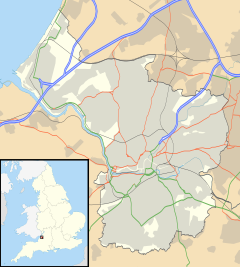51°27′21″N 2°35′43″W / 51.45583°N 2.59528°W
| Church of St John the Baptist | |
|---|---|
 St John's church showing the gateway over the city wall | |
| General information | |
| Town or city | Bristol |
| Country | England |
| Coordinates | 51°27′23″N 2°35′48″W / 51.456313°N 2.596605°W |
The Church of St John the Baptist in Bristol, also known as St John on the Wall, is a historic church in the care of heritage charity the Churches Conservation Trust. The upper church and its medieval vaulted crypt is located at the lower end of Broad Street and is built into the old city's medieval walls.
Design and construction
editThe church was built in the 14th century (and heavily modified in the 19th century) with the tower and steeple over St John's Gate, the last remaining city gateway. The church is very narrow as it is built into and alongside the city walls. Consequently, it is also known as St John's on the Wall.[1] The rood stair entrance high up on the wall shows where the earlier great rood screen would have stood. Similar rood stair entrances can be seen at St Peter's, St Philip and Jacob, St Stephen's and Temple.[2] Beneath the church is a vaulted crypt, which was dedicated to the Holy Cross.[3] A conduit has supplied water from Brandon Hill since 1374, and the course of the pipe is marked in places by small plaques set into the pavements.[4]
Monuments and artwork
editAmong the monuments in the church are those of Walter Frampton (died 1357), three times Mayor of Bristol and a great benefactor of the church, and a brass commemorating Thomas Rowley (died c. 1478), whose name was used by the 18th-century teenage poet Thomas Chatterton as a pseudonym under which to write his forgeries of medieval poetry.
On the south side of the gate, there are statues of the legendary founders of Bristol, Brennus and Belinus, facing up Broad Street; it is possible that they are actually older than the fabric of the gate.
The interiors of the two arches either side of the main gateway are now covered in commissioned graffiti murals.
The burial ground of St John's survives; it is visible from John Street and the entrance gate is in Tailors Court which is accessed from Broad Street. The burial ground is closed to the public.
Archives
editParish records for St John the Baptist church, Bristol are held at Bristol Archives (Ref. P.St JB) (online catalogue) including baptism and marriage registers and a burial register. The archive also includes records of the incumbent, churchwardens, overseer of the Poor, parochial church council, charities, schools and vestry plus deeds, plans and photographs.
Current usage
editSt. John on the Wall is cared for by The Churches Conservation Trust, the national heritage charity. It is open daily for free tours and interactive visitor displays telling the story of medieval Bristol. St John on the Wall hosts a small programme of free family events, gigs, exhibitions and concerts. It's recorded in the National Heritage List for England as a designated Grade I listed building.[5] The church was vested in the Trust on 25 June 1985.[6]
The Churches Conservation Trust promotes 'The Crypt' as an atmospheric art space for hire as a live music venue and art gallery. It can also been used as a filming location[7]
in 2022 the church was closed due to fears that the spire was becoming unstable.[8]
Congregation
editAfter the bombing of St Mary le Port Church in 1940 the congregation of this historically evangelical, Protestant and Calvinist church, and their rector, William Dodgson-Sykes, moved to St John on the Wall Church, where the congregation remained, in gradually declining numbers, until the building was closed for worship by the Church Commissioners in 1984,[9] (after a protracted struggle by the congregation). The remaining congregation then moved to the Chapel of Foster's Almshouses, and joined the Church of England (Continuing) in 1995.[10] The C of E (Continuing) no longer lists a congregation in Bristol - some of the congregation joined with the new Free Presbyterian Church (Ulster) congregation in Horfield, Bristol.
See also
editReferences
edit- ^ "St John's on the Wall". Looking at Buildings. Archived from the original on 27 September 2007. Retrieved 17 May 2007.
- ^ M Q Smith, The Medieval Churches of Bristol, The University of Bristol (Bristol Branch of the Historical Association), 1970.
- ^ Norman, Michael (2002). St John the Baptist's Church Bristol. Churches Conservation Trust.
- ^ Burrough, THB (1970). Bristol. London: Studio Vista. ISBN 0289798043.
- ^ Historic England, "Church of St John the Baptist and St John's Gate, Bristol (1202022)", National Heritage List for England, retrieved 9 July 2013
- ^ Diocese of Bristol: All Schemes (PDF), Church Commissioners/Statistics, Church of England, 2011, p. 2, retrieved 1 April 2011
- ^ 'Maiden' by Heg & the Wolf Chorus, published 26 March 2014
- ^ "Bristol church closed over fears for unstable spire". BBC News. Retrieved 18 August 2022.
- ^ Mellor, Penny (2013). Inside Bristol: Twenty Years of Open Doors Day. Redcliffe Press. pp. 64–65. ISBN 978-1908326423.
- ^ "Obituary of Harold George Harris" (PDF). The Journal of The Church of England Continuing, Issue No. 5, February 1997. 1997. p. 10. Archived from the original (PDF) on 25 July 2011. Retrieved 19 December 2010.
External links
edit- Media related to Church of St John the Baptist, Bristol at Wikimedia Commons
- St John on the Wall, Bristol, at Churches Conservation Trust
